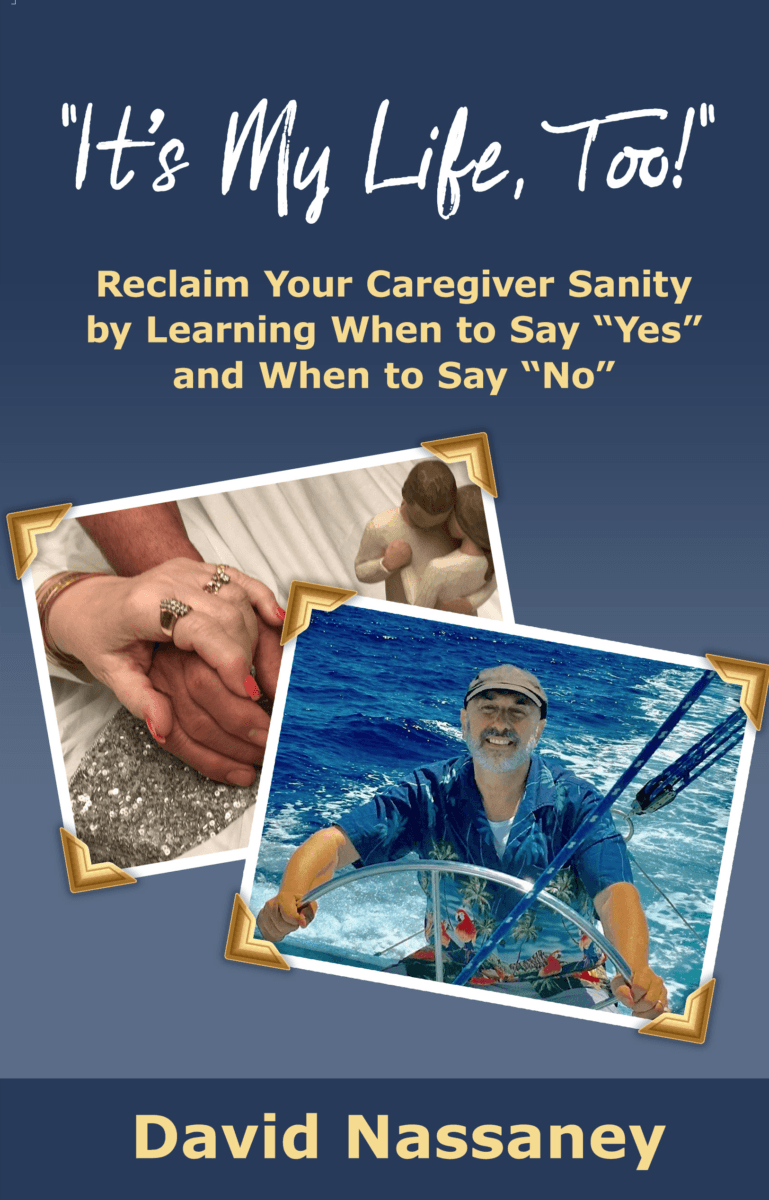On sale in September (Watch for Pre-Sale Notification)
 Say “Yes” to Team Building; Say “No” to Isolation
Say “Yes” to Team Building; Say “No” to Isolation
Since I was Charlene’s husband, everyone assumed that I would become her primary caregiver. I shared that assumption and took on that role without hesitation. But I now see myself, not as the sole provider of Charlene’s care, but as the coordinator of her care. If you define your role in this same way, you’ll see your life from a new vantage point.
From Caregiver to Care-Coordinator
We use the term “caregiver” in our society to mean a great many things, ranging from informal aides to professionals who assist people of all ages. I use the term in defining myself as the Caregiver’s Caregiver. My hope is to help other caregivers avoid burnout while living exciting and fulfilling lives. But let’s take a closer look at the term to see how it might set us up for burnout.
If we see ourselves as the sole giver of care, then it’s natural for us to feel solely responsible for meeting all aspects of our loved ones’ lives. We must be chief cook and bottle washer, medicine provider, transporter, bather, dresser, companion, entertainer . . . the list is endless. No one is capable of fulfilling all of these roles. Not only is this a misunderstanding of one’s calling, it’s impossible to meet all the needs of any other human being. It simply can’t be done. If you try, you will burn out.
But if you see yourself as the point person, the coordinator of your loved one’s care, then a great load is lifted off of your shoulders. It’s no longer your responsibility to meet your loved one’s needs by yourself. Your task is to build a team of people who meet your loved one’s needs, while making sure your needs are met as well.
I discovered in my own life, and while talking with many other caregivers, that taking on this new perspective is challenging. Here are some things that block us from getting the support we need.
Get Over Your Pride
Since I believed that it was my job to take care of Charlene, I thought it was a sign of weakness or failure if I asked for help. Looking back on this now, I am stunned at how ridiculous I acted. How could I have thought I was capable of such a task? No one can be a long-term caregiver all by themselves. And yet, so many of the people I work with buy into that delusion. And it is a delusion—because we over-estimate our human limitations and set ourselves up for failure.
As I mentioned in a previous chapter, my wife’s mother (and her husband) moved in with us to help with Charlene’s care. I am very thankful for the assistance, and I don’t know how we would have made it without her. But at the beginning, I felt like their help was required because I was inadequate for the job. It took a lot of pride-swallowing on my part to ask them to move in with us. I’ve gotten over that. When I need help from other people, I ask for it. If this is a problem for you, you need to get over it too. For example, I hated to ask for help with certain things that I hated doing, like the shopping. Charlene likes to shop—no, she loves to shop. She can spend five hours at the grocery store, while I can only take about an hour or two before I go bananas and need to lie down. So I asked some friends who also love to shop to take her. However, it turns out that she wore them all out, and so far, no one can do five hours in the supermarket either. As a result, no one seems to offer to take her shopping anymore, so now it’s me again that takes her.
Let me be brutally honest here—if you let your pride get in the way of creating a team of people who will help you care for your loved one, it could kill you. Dramatic? Not really. Let this statistic sink in: 30 percent of caregivers die before the person they are taking care of. Thirty percent! Burnout is deadly, and if your ability to function is compromised, or you become ill yourself, who will provide for your loved one? And if you’re dead, well . . . that speaks for itself.
The power over whether or not you burn out as a caregiver and perhaps die prematurely is completely in your hands. You hold all the cards. Only you can (and must) set up boundaries and realistic expectations for yourself that will ensure you are around to care for the one you love. Don’t let pride or a false sense of humility set you up for illness and failure. You are a wonderful human being who has chosen to take care of your loved one. But remember, you are only a human being. No more.

